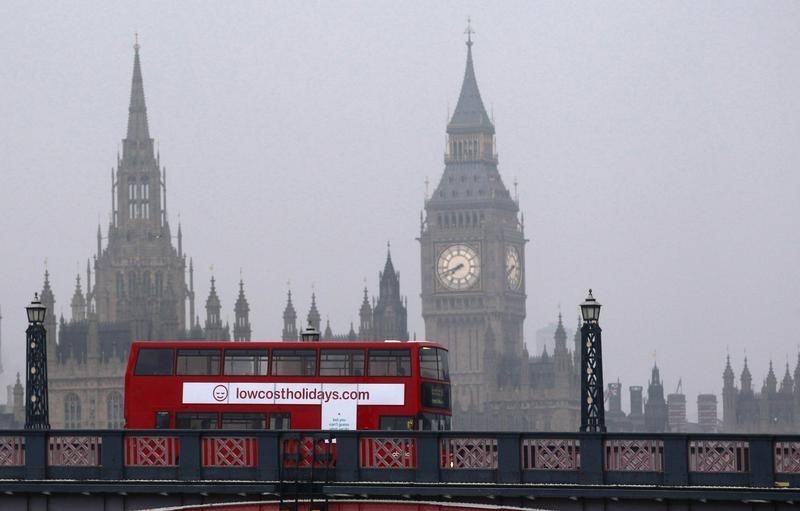By David Milliken
LONDON (Reuters) - Britain's recovery is losing steam as worries about the world economy grow, consumers curb spending and manufacturing weakness spreads to the dominant services sector, a major business survey suggested on Monday.
Financial data company Markit said its monthly all-sector purchasing managers' index (PMI) had fallen to its lowest since April 2013, suggesting the economy as a whole was now growing at a rate of just 0.3 percent, its weakest in nearly three years.
Sterling weakened against the dollar and euro as investors bet the news would make the Bank of England reluctant to move closer to raising interest rates at this week's policy meeting.
"The Monetary Policy Committee's statement on Thursday is likely to show a further drift to a softer outlook for both growth and inflation," Citi economist Michael Saunders said.
Britain's economy was the fastest-growing in the G7 group of major advanced economies in 2013 and 2014, and recorded growth of 0.7 percent in the three months to June.
But Markit said its figures suggested gross domestic product (GDP) growth had slowed to 0.5 percent in the third quarter -- around Britain's long-run average -- and could be slower in the fourth quarter.
Conservative finance minister George Osborne told his party's annual conference on Monday he saw "a lot of economic risk out there" and Britain should be "prepared for whatever the world throws at us".
Britain's slowdown is more marked than that recorded in the euro zone PMI, with the services component below its euro zone equivalent for the first time in just over four years.
"Weakness is spreading from the struggling manufacturing sector, hitting transport and other industrial-related services in particular. There are also signs that consumers have become more cautious and are pulling back on their leisure spending," Chris Williamson, chief economist at Markit, said.
LOWEST PMI IN ALMOST 2-1/2 YEARS
The headline services PMI dropped to 53.3 in September from August's 55.6, its lowest since April 2013 and well below any forecast in a Reuters poll of economists. The expectations component was its lowest since August 2014.
The all-sector PMI, which factors in last week's weak manufacturing and construction PMIs, also sank to its lowest since April 2013 at 53.9, down from 55.4.
Firms cited weakness in demand linked to China's stock market falls -- echoing the picture in a quarterly corporate investment survey by accountants Deloitte, which also showed the cloudiest outlook in 2-1/2 years.
Last month the BoE's chief economist Andy Haldane said he feared the world could be on the brink of a new stage of financial crisis, this time centred around heavily indebted emerging markets.
"Some firms reported hesitation among clients in placing new contracts, linked to global economic uncertainty," Markit said, as the inflow of orders fell to its weakest in over two years.
But the survey suggested stronger demand from Europe and Africa, and some economists saw it pointing to more normal growth rates rather than potential stagnation.
The PMI figures follow unexpectedly weak U.S. hiring numbers on Friday and reduce the chance that other members of the BoE's nine-member MPC will join Ian McCafferty in voting for an interest rate rise this week.
Most economists do not expect the BoE to start raising rates until early next year at the earliest, and financial markets on Friday pushed back their expectations of a first rate rise since 2007 towards the end of next year or even early 2017.

Economists at Nomura switched their forecast to May from February on Monday, and Royal Bank of Canada said it was likely to revise down its forecast for third-quarter GDP due to the services data.